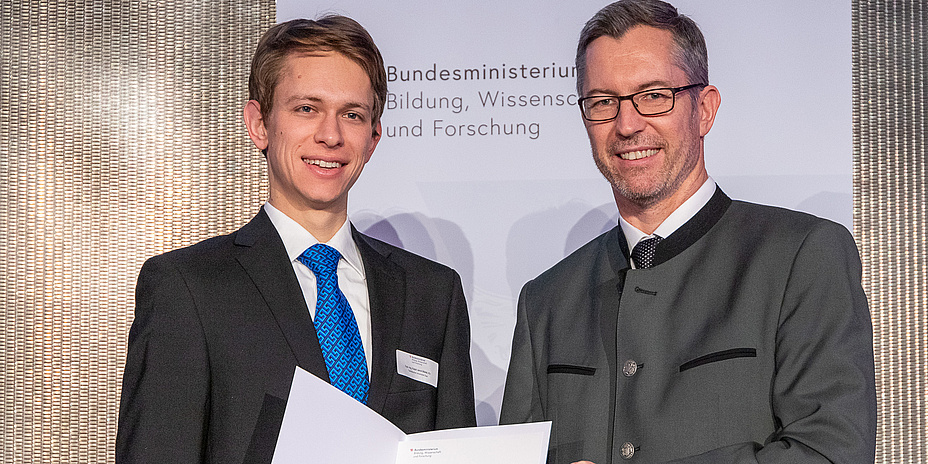"I want to bring neural networks to building sites"

"With the help of artificial intelligence, the construction industry could work even more efficiently," says Ralph Stöckl from the Institute of Construction Management and Economics at TU Graz with conviction. And that's exactly what he's working on. He integrates learning computers into the construction process, thereby optimizing it. Artificial intelligence can, for example, use past experience to make specific forecasts about duration and costs before the start of a new construction project. Or, in the middle of the construction process, suggest an optimal procedure based on various variable parameters, such as weather data or team composition: "When rain is forecast, the AI independently recommends, for example, postponing work that is sensitive to moisture and prioritising less delicate work in return." But wouldn't an experienced specialist be able to do this? "Of course. AI will never replace a human being but it can give advice and recommendations." From the point of view of the companies, this brings up an important point: "An experienced person will leave a company sooner or later and their knowledge and expertise will be lost. Once an AI system has learned this contextual information, the individual knowledge of the person is lost, but not the artificial knowledge. This would make it much easier to train new employees."
AI will never replace a human being but it can give advice and recommendations.
Health check for construction site tools
In addition to AI, an important aspect of a smart construction process is the networking of the various construction tools – both among themselves and with the neural network. "If the condition of the individual tools is systematically recorded, maintenance intervals can be integrated into the planning in advance. This minimizes downtime and idle time on the building site." Even suddenly occurring problems can be reduced with the help of AI: "If a tool provides problematic data, the AI can send it directly to the workshop and thus prevent major disruptions in the construction process."
First successes with test networks
And how far developed is the system already? "We’ve built test networks that work really well," says the researcher. He uses so-called supervised learning; one of several possibilities in which neural networks are used. The process is similar to learning with a teacher. The AI is fed with available data from the past and thus learns which results could be achieved under which conditions. With this information it can draw conclusions for future projects and learn from new data gained.
The current test systems work with fictitious data at the moment because it is still difficult to obtain real data from companies. On the one hand, because it has not been usual up to now to record processes accurately over long periods of time. And secondly, because the equipment on the building sites is still missing: "For a comprehensive collection of data, we would need not only data about all construction machinery and the progress of the building work, but also weather data, team compositions, movement data and so on," explains Stöckl.
Together with his research team, he is looking for suitable project partners to provide existing data or would be willing to record the necessary data in a future construction project.
University boy
Stöckl says that there is great interest in the new technology in the construction industry. "Artificial intelligence is in vogue in many areas of research. And everyone is trying to apply the new technology to their own problems." Stöckl himself discovered the construction industry and at the same time information technology at a young age. "As a child, I stood at construction sites so often that an excavator driver even let me ride along once," he says today and laughs. He dealt with AI for the construction industry for the first time in his master's thesis in Construction Management and Civil Engineering. The thesis was awarded the honorary prize of the Federal Ministry of Education, Science and Research in 2019. Today, Stöckl is in the middle of his doctorate and has also completed his second master's degree in Structural Engineering in parallel.
In medicine, for example, where the subject is already very advanced, the advantages are already quite clear.
At the age of 26 he seems very young. The mischievous smile tells the story. This is something that does not always do him favours in the rough construction world: "Of course it can happen that a seasoned foreman asks what I, a university boy, can tell him. I can handle that. People need to be made aware of the potential that lies in AI. In medicine, for example, where the subject is already very advanced, the advantages are already quite clear. We have to orientate ourselves to that and make the enormous benefits of AI known to the construction industry as well."
This research area is anchored in the Field of Expertise “Mobility & Production”, one of five strategic foci of TU Graz.
You can find more research news on Planet research. Monthly updates from the world of science at Graz University of Technology are available via the research newsletter TU Graz research monthly.
Kontakt
Ralph Jakob STÖCKL
Dipl.-Ing. Dipl.-Ing. BSc
Institute of Construction Management and Economics
Lessingstraße 12/II
8010 Graz
Phone: +43 316 873 6254
ralph.stoeckl@tugraz.at



